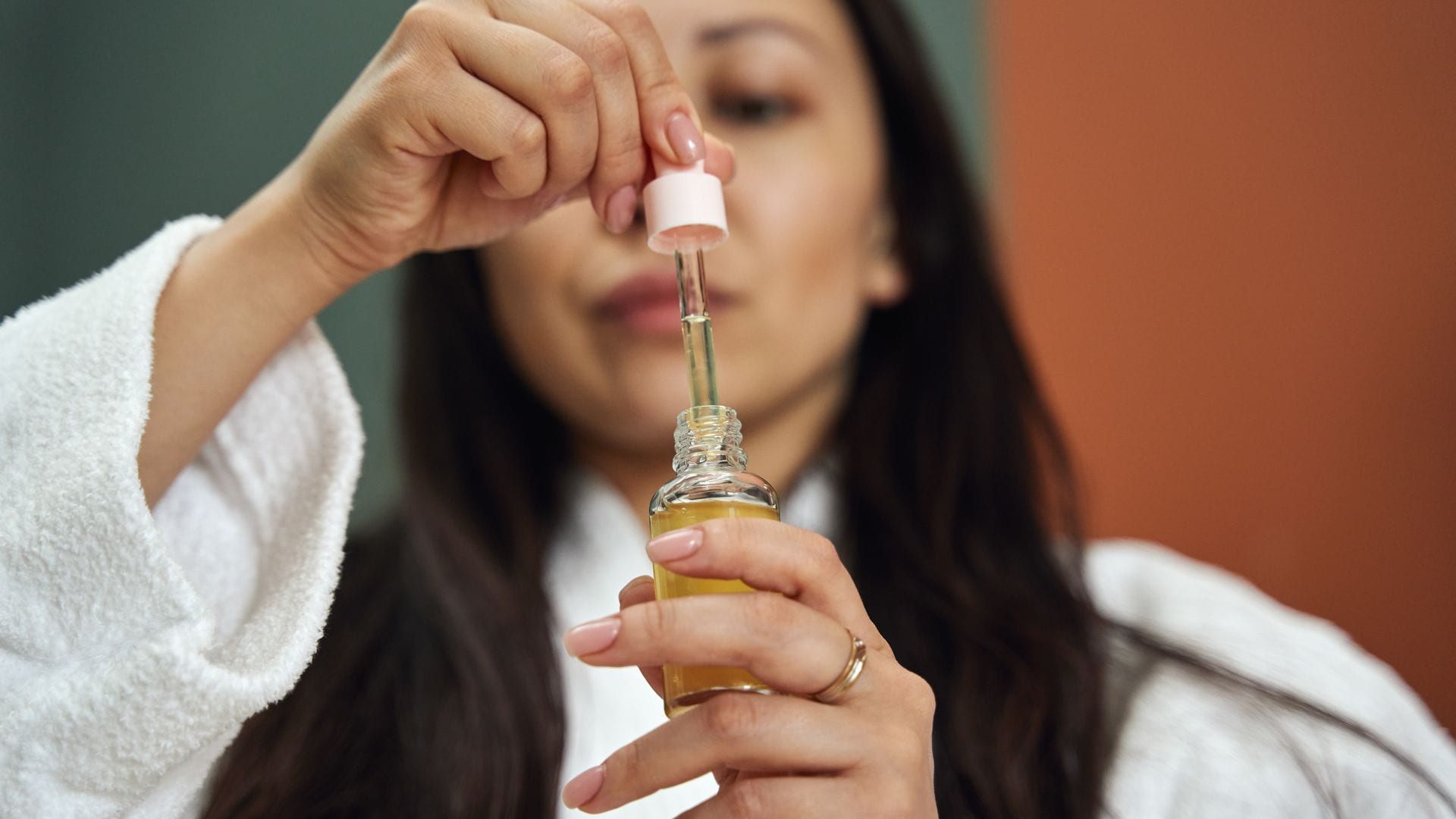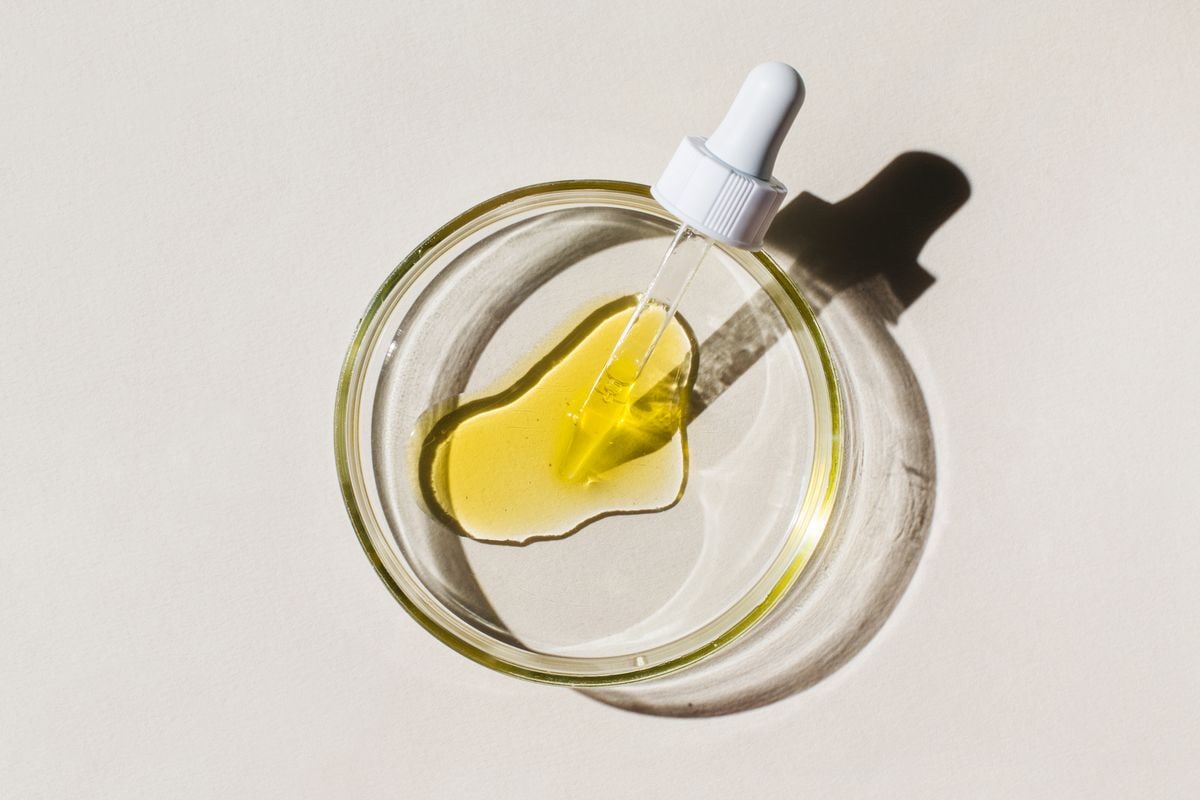Castor oil is a timeless remedy, often associated with grandma's trusted treatments. This oil is derived from the seeds of the Ricinus communis plant, which is native to India and Africa. It is extracted through a cold pressing method, ensuring the purest castor oil is obtained.
It has a slight yellowish color and a not-very-pleasant smell. This product has been used for many years, especially in India, and is part of Ayurvedic medicine thanks to its antibacterial, anti-inflammatory, digestive system, and skin properties.
Fatty acids, specifically ricinoleic acid, which is exclusive to this substance, are responsible for its beneficial health properties. This substance is used in many cosmetic products for its moisturizing power and consistency in the formulas, which is why it often appears in lipsticks.
Ricinoleic acid is an unsaturated fatty acid with anti-inflammatory and antibacterial properties. It also contains oleic and linoleic acid and stearic and dihydroxy stearic acid. Ricin and ricinin are alkaloids that contain the enzyme lipase. It is also rich in vitamin E and proteins.
How is Castor Oil Used?
In addition to these beneficial properties for health, it is used to soften the skin in cosmetics, including soaps and massage oils, and even in the textile industry.
Castor oil can be used in several different ways
- When using the oil externally, such as for treatment or massage, it's important to note that some individuals may have allergies. Therefore, it is advisable to test a small amount on a small skin area before applying it more widely.
- The oil can be used as a purifying agent or laxative for internal use. If you plan to ingest it, read the instructions carefully and purchase a product that meets safety standards. Never exceed the recommended dosage; typically, for adults, this is one teaspoon in the morning, while for children over 12 years old, it is half a teaspoon. It is essential not to take it continuously for long periods due to its laxative effects. It can be added to juices if preferred to help mask the strong taste and smell.
What are the properties of Castor Oil?
TOPICALLY OR EXTERNALLY
DRY SKIN
This oil is beneficial as a nutrient for dry skin not only because it is an oil but also due to its rich fatty acid content, which helps improve the health of drier skin. To reduce its strong smell, it can be diluted with sweet almond or rosehip oil, which also aids in regenerating dry skin. Thanks to its nourishing properties, it is effective in addressing issues such as wrinkles, crow's feet, stretch marks, and scars. For best results, apply it every night.
CALLUSES ON THE FEET
We can enhance the healing and soothing of calluses on the feet, including those on the toes and cracked heels. To improve the condition of calluses on your feet, follow these steps:
- Soak your feet in hot water to soften the calluses.
- Use a foot file to remove the hardened skin gently.
- Thoroughly dry your feet.
- Apply castor oil to the affected areas. Create an occlusive patch to cover the area; you can soak it and leave it covered overnight for best results.
- Tip: Repeat this process several times a week for optimal results.
FOR MILD ACNE
Castor oil possesses strong antimicrobial and anti-inflammatory properties, effectively combating skin infections, including fungal infections and acne. Like coconut oil, it is essential to consider the type of acne when using castor oil; for instance, it is not recommended for very severe acne but can be beneficial for mild acne. It is beneficial when the skin is treated with anti-acne medications that tend to irritate. To use castor oil, clean the skin and apply it to a cotton pad soaked in castor oil as a tonic to help reduce inflammation.
STRETCH MARKS
Due to its high fatty acid content, this oil helps prevent stretch marks and promotes tissue regeneration. However, it's essential to remember that the skin during pregnancy is much more sensitive, so a patch test beforehand is necessary. If you already have stretch marks, you can exfoliate the skin and massage castor and coconut oil onto the affected areas. Cover the area with plastic wrap whenever possible to create an occlusive treatment. I recommend applying the oil warm for better absorption.
SUNBURN
Thanks to its anti-inflammatory and regenerative properties, this oil effectively treats sunburn. Its active ingredients, including ricinoleic acid, omega-3, and omega-6, help maintain skin elasticity and reduce swelling and inflammation. Additionally, it aids in skin regeneration and promotes collagen and elastin production. I recommend diluting the oil with equal amounts of coconut or sweet almond oil and gently massaging it into the affected area. You can also apply compresses soaked in the oil as a poultice.
NAILS
Castor oil offers essential nutrition and helps strengthen the nails for brittle and dry nails. It also promotes nail growth. Due to its antiseptic and antifungal properties, castor oil protects nails from potential fungal infections. If one nail is affected, it is advisable to apply a few drops of castor oil to the other nails using a cotton ball to prevent the infection from spreading. A simple way to apply castor oil is to mix a few drops of it into your hand cream. Consistency is vital, so be sure to use the cream at least before going to bed.
DAMAGED LIPS
Glycerin is thick and viscous, helping nourish and improve chapped lips. Many brands incorporate it into their lip products, contributing to the texture and consistency of the formulas. Glycerin is also a good source of vitamin E, which nourishes the lips and helps keep them pink.
You can easily prepare a lip balm at home using glycerin, a few drops of lemon juice, and castor oil. It can be applied alone at night or mixed with Vaseline to create a thicker balm.
HAIR
Castor oil is well-known for its benefits in promoting hair growth and maintaining scalp health. It can help prevent and alleviate scalp infections such as dermatitis, dandruff, and seborrhea. Additionally, castor oil enhances hair thickness and shine, making the hair fibers more resistant to breakage. To encourage hair growth and address excessive dandruff, gently massage warm castor oil into the scalp at night. This will stimulate growth by increasing oxygenation to the area and eliminating potential bacteria or fungi that cause seborrhea. Wash your hair the following morning.
Castor oil can be somewhat irritating. If you have a sensitive scalp, it is advisable to dilute it with a carrier oil such as coconut oil, olive oil, or sweet almond oil.
FOR EYEBROWS AND EYELASHES
Castor oil is widely used to promote the growth and thickness of eyebrows and eyelashes. Its rich content of proteins, vitamins, and fatty acids stimulates hair follicles and helps prevent hair loss.
To use castor oil:
Apply a small amount with a cotton swab before bed. Gently massage it in circular motions on your eyebrows and along the eyelash line, carefully avoiding contact with your eyes. For best results, use the oil daily for at least a month. You may start noticing improvements in thickness after about ten days.
You can also use an eyebrow brush with less oil during the day, as it will be less noticeable. It's important to note that the hair growth cycle for eyebrows is shorter than that for scalp hair, typically lasting two to three months, though this can vary based on individual nutrition.
It is best to use an eyeliner brush to apply castor oil to your eyelashes. After applying, you can also use an eyelash comb with castor oil. Ideally, you perform these treatments at night and wash your face in the morning.
IMPROVES THE SYMPTOMS OF ARTHRITIS
Massaging slightly warm castor oil can help alleviate joint pain and reduce inflammation. Alternatively, apply a thin layer of castor oil and place a warm cloth or towel over it.
INTERNALLY
BENEFICIAL ACTION ON THE LYMPHATIC SYSTEM
This improves drainage and the elimination of toxins and stimulates lymphocyte production. Castor oil in the small intestine is hydrolyzed by pancreatic enzymes and converted into glycerol and ricinoleic acid, which helps eliminate toxins in the body.
STIMULATES UTERINE CONTRACTIONS IN CHILDBIRTH
One of the oldest uses of castor oil is to stimulate childbirth. For centuries, it has been given to pregnant women to induce labor and promote uterine contractions. It is crucial to consult with a doctor before using castor oil for this purpose, as it can lead to side effects such as diarrhea and nausea, among others. This action is linked to castor oil stimulating intestinal motility through irritation, which induces contractions of the smooth muscles in the uterus.
CONSTIPATION
Castor oil is known for its effectiveness as a laxative and purifier. When a small amount is consumed, its active component, ricinoleic acid, binds to receptors in the smooth muscle cells of the intestine. This binding irritates the muscles, causing them to contract and promote bowel movements, similar to mechanical stimulation.
Additionally, castor oil can stimulate the uterus, potentially inducing labor, which is why pregnant women should not use it. It is particularly beneficial for individuals suffering from chronic constipation, as it aids in the elimination of feces. However, it is not recommended for children under 12 years old or for individuals over 60 years old who have digestive issues, as it may lead to diarrhea and potassium depletion.
The recommended dosage is 15 ml (one tablespoon) per day. Because the flavor is quite strong, it can be mixed with juice or taken cold. Castor oil acts quickly as a laxative, typically within two to six hours, so taking it at night before bedtime is not advisable. Prolonged use is discouraged, as the intestines may become reliant on the oil for stimulation and cease to function independently.
PRECAUTIONS WHEN USING CASTOR OIL
Castor oil can be used both topically and orally. It is most commonly used as a laxative when taken orally, with a maximum recommended dose of 0.7 mg per kilogram of body weight. An overdose may lead to side effects such as diarrhea, abdominal cramps, colic, nausea, and intestinal irritation. Therefore, it is generally not recommended for pregnant women without a doctor's approval. Additionally, castor oil can cause potassium loss and is contraindicated in cases of intestinal obstruction, ulcerative colitis, Crohn's disease, irritable bowel syndrome, and appendicitis.
Castor oil is less commonly used topically. While it is an entirely natural product and does not cause photosensitivity, conducting a patch test before applying it is crucial. It should not be applied to the eyes or nose and is also not recommended for use on pets or children under 12.
MY RECOMMENDATIONS
Many castor oil brands are available, and some specifically indicate whether they are suitable for topical or oral use, although both applications are possible. For the best quality, I recommend choosing organic, cold-pressed castor oil.
In the market, you will find two main types of castor oil: yellow castor oil, which is the classic variety, and Jamaican black castor oil. Yellow castor oil is produced by directly pressing castor seeds, while black castor oil is made from seeds that have been roasted before extraction. This roasting process gives the black castor oil a distinct burnt or roasted aroma and results in a slightly more basic pH due to the ashes from the roasting process. However, the properties of both oils are similar.
Some recommended brands include:
- LINITUL PUKKA Castor Oil
- ORRAVAN Castor Oil
- CAMMILE Castor Oil
- Organic NOW Solutions Castor Oil
- Simply Organic Castor Oil
- Jamaican Black Castor Oil










